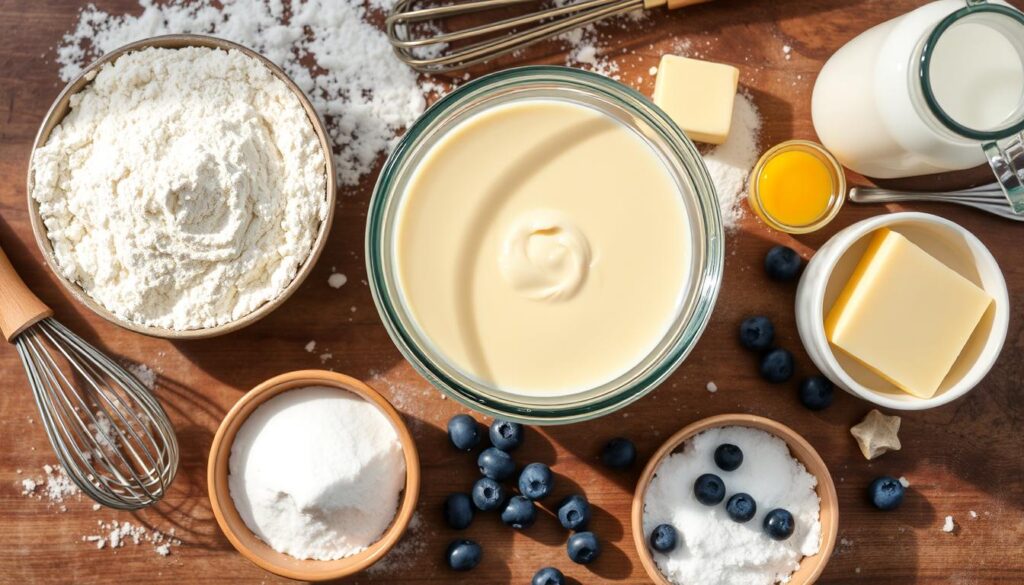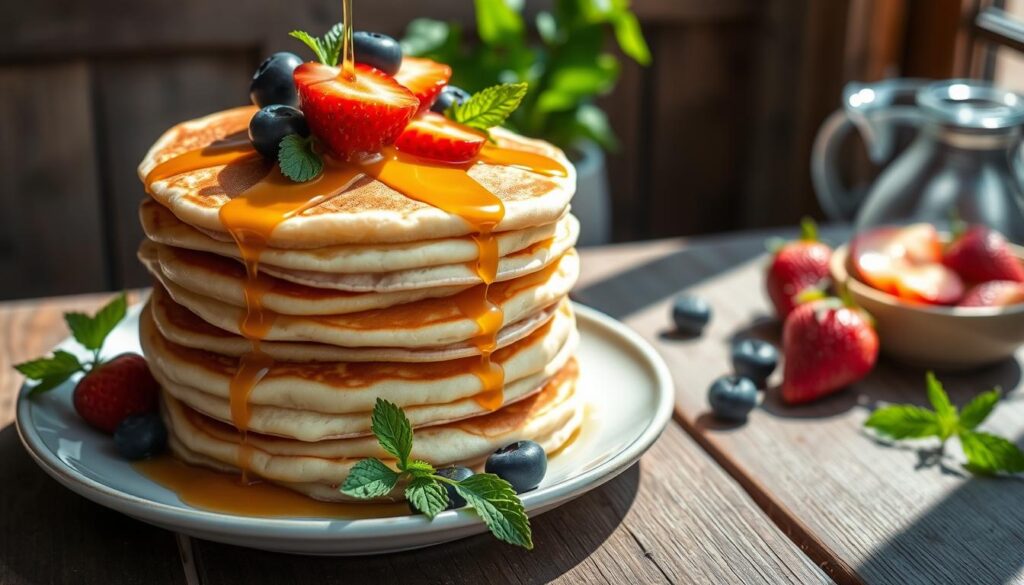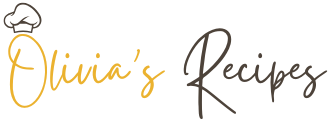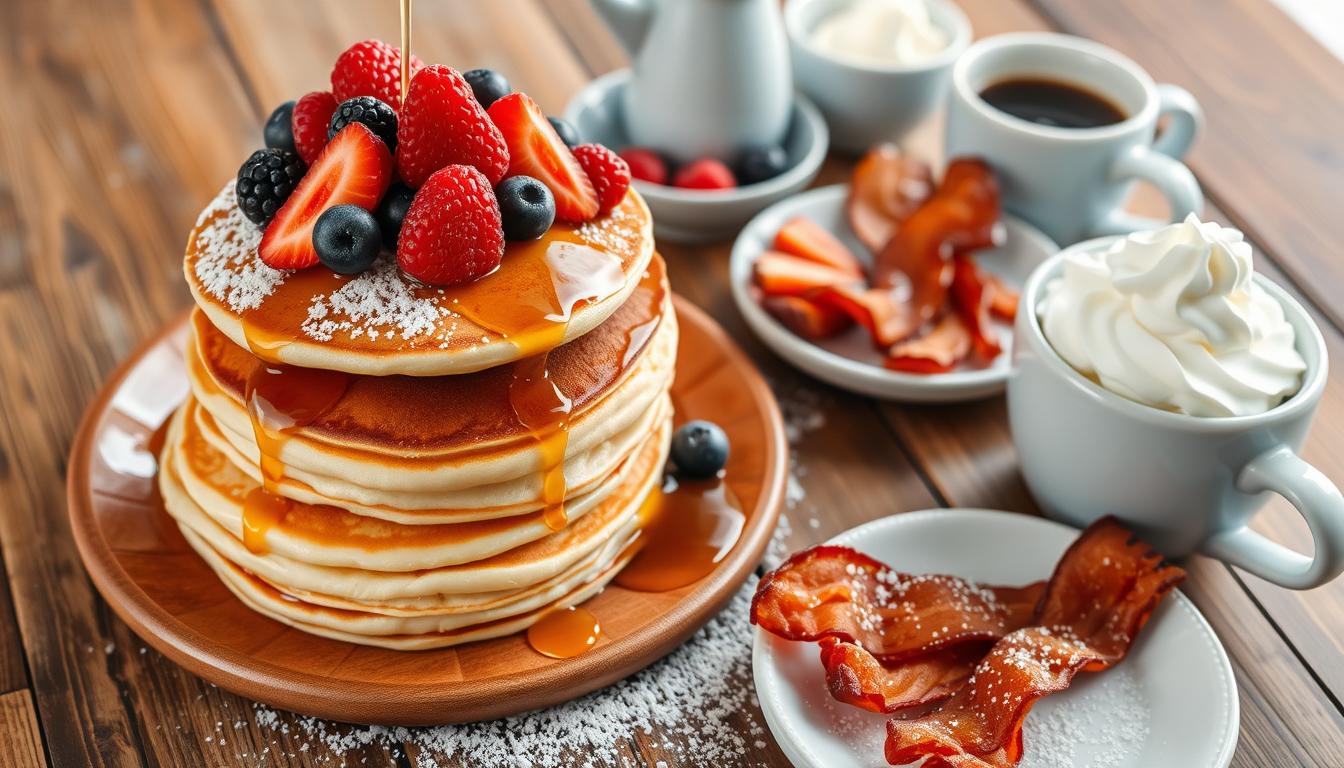The smell of fresh pancakes in the kitchen is amazing on a weekend morning. They are soft, fluffy, and sweet, making you feel cozy. Whether it’s for the family or just for you, a pancake breakfast can make your day better.
This guide will show you how to make the best pancake breakfast. We’ll cover making the batter, creative toppings, and serving ideas. You’ll learn how to make pancakes that everyone will love, even asking for more!
Essential Ingredients for the Perfect Pancake Batter
Making the perfect pancake batter is all about finding the right mix of ingredients. At the core is all-purpose flour, which gives the pancakes their structure and texture. Adding baking powder makes the batter rise, creating fluffy, golden pancakes.
All-Purpose Flour vs. Specialty Flours
All-purpose flour is the top pick for most pancake recipes. But, trying out specialty flours can add new flavors and textures. Buckwheat flour gives a nutty taste, while rice flour makes for a light, gluten-free pancake. Try different flours to discover your favorite.
The Role of Leavening Agents
Baking powder is key for those light, airy pancakes. It mixes with wet ingredients to create air pockets that make the pancakes rise. Adding a bit of baking soda also helps with the rise and browning.
Wet Ingredients Selection
| Ingredient | Amount |
|---|---|
| All-Purpose Flour | 2 cups |
| Granulated Sugar | ¼ cup |
| Baking Powder | 4 teaspoons |
| Baking Soda | ¼ teaspoon |
| Salt | ½ teaspoon |
| Milk | 1 ¾ cups |
| Butter | ¼ cup |
| Vanilla Extract | 2 teaspoons |
| Large Egg | 1 |
The wet ingredients, like milk, eggs, and melted butter, are crucial for the batter’s consistency and taste. Try different milks, from whole milk to buttermilk, to see what you like best.
“The key to fluffy, golden pancakes lies in the perfect balance of dry and wet ingredients.”

Classic Buttermilk Pancake Recipe
Start your day with a stack of buttermilk pancakes. They offer a fluffy texture and a tangy flavor. Enjoy them alone or with your favorite toppings for a satisfying breakfast.
The secret to these buttermilk pancakes is in the ingredients. You’ll need all-purpose flour, baking powder, baking soda, salt, and sugar. Buttermilk and melted butter add a moist crumb and a tangy taste that’s perfect with maple syrup.
To make these buttermilk pancakes, mix the dry ingredients first. Then, gently add the wet ingredients until just combined. Don’t overmix to avoid a tough texture. Cook on a preheated griddle or skillet until the edges are set and the centers are bubbly.
| Nutrition Facts | Per Serving |
|---|---|
| Calories | 204kcal |
| Carbohydrates | 30g |
| Protein | 7g |
| Fat | 6g |
| Saturated Fat | 3g |
| Cholesterol | 55mg |
| Sodium | 533mg |
| Calcium | 124mg |
Serve these buttermilk pancakes warm with maple syrup and butter. You can also add fresh fruit, whipped cream, or powdered sugar. This recipe is perfect for making your breakfast special.

Common Pancake Making Mistakes to Avoid
Making perfect pancakes is a fun journey, but avoid common mistakes. Issues like wrong batter mixing and temperature problems can mess up your pancakes. Let’s look at these mistakes and how to fix them for fluffy, golden pancakes.
Proper Batter Mixing Techniques
Mixing the batter right is key. Overmixing makes pancakes tough, while undermixing causes uneven cooking. Mix wet and dry ingredients gently until just combined. Avoid stirring too much.
Temperature Control Tips
Right temperature is vital for even pancakes. Heat your griddle or skillet to medium. High heat burns the outside before the inside cooks. Grease the pan with butter or oil to prevent sticking and ensure even color.
Flipping and Timing Secrets
Flipping pancakes well takes practice. Wait for bubbles and dry edges before flipping. Use a quick, confident flip to avoid tearing. Resting the batter for 45 minutes to an hour improves texture and taste.
| Common Mistake | Recommended Technique |
|---|---|
| Overmixing the batter | Gently fold the wet ingredients into the dry until just combined |
| Improper temperature control | Preheat the griddle or skillet to medium heat and grease the pan before each batch |
| Flipping too soon | Wait until bubbles form on the surface and edges look dry before flipping |
Master these pancake tips and cooking techniques for a stack of fluffy, tasty pancakes. Your family and friends will love them.
Creative Pancake Breakfast Toppings
Make your pancake breakfast special with new toppings. Try fresh fruits, rich spreads, and more. These options will make your meal unforgettable.
Begin with sweet toppings like blueberries, strawberries, and bananas. Add creamy nut butters or sweet chocolate chips for a treat. Top with whipped cream and maple syrup for a fancy touch.
For savory lovers, try bacon, cheese, or smoked salmon. Mix ricotta with orange supremes and honey for a unique taste. Or, try a Dutch baby pancake with apples cooked in brown butter and cardamom sugar.
There are countless ways to make your pancake breakfast amazing. Be creative with pancake toppings and breakfast ideas. Find your favorite mix.
“The secret to a great pancake breakfast is to have an array of delicious toppings for your guests to choose from. It’s the perfect way to cater to everyone’s tastes.”
Planning the Perfect Pancake Breakfast
Hosting a pancake breakfast needs careful planning. Start by creating a menu with different pancake flavors and sides like bacon, sausages, or fruit. Make sure to cook the pancakes just right, so they’re hot and fluffy when served.
Menu Planning and Timing
Plan your menu with classic buttermilk pancakes and special flavors. Add tasty toppings like maple syrup, whipped cream, or chocolate chips. Cook the pancakes fresh to serve them hot to your guests.
Serving Suggestions
Use warm plates or chafing dishes to keep pancakes hot. Offer both savory and sweet sides for guests to choose. Provide a range of toppings, from maple syrup to peanut butter and bananas.
Kitchen Equipment Needed
Make sure your kitchen is ready for pancake making. Use a large griddle or skillets to cook many pancakes at once. You’ll also need mixing bowls, a whisk, a spatula, and measuring tools for the batter.
With good planning, timing, and kitchen tools, you’ll make a memorable pancake breakfast. Whether it’s a breakfast buffet or a cozy brunch menu, these tips will impress your guests.
| Equipment | Purpose |
|---|---|
| Large Griddle or Skillets | Efficient Pancake Cooking |
| Mixing Bowls | Batter Preparation |
| Whisk | Batter Mixing |
| Spatula | Pancake Flipping |
| Measuring Cups and Spoons | Accurate Ingredient Portioning |
Savory Pancake Variations
Sweet pancakes are a favorite for breakfast, but savory pancakes offer a tasty twist. They can make your weekend brunch special. Try these savory pancake options for a unique breakfast.
Cheddar and Scallion Pancakes
Add sharp cheddar cheese and fresh scallions to your pancakes. The melted cheddar makes them rich, and the scallions add a hint of onion. Top with sour cream or guacamole for creaminess.
Potato Pancakes (Latkes)
Potato pancakes, or latkes, are crispy and tender. Grate potatoes, mix with eggs, flour, and spices, then fry until golden. Serve with applesauce, smoked salmon, or a fried egg for a filling meal.
Vegetable-Packed Fritters
Make veggie-loaded fritters with savory pancakes. Shred zucchini, corn, carrots, or spinach and mix into pancake batter. This breakfast is packed with nutrients and can be enjoyed with a dipping sauce.
Korean-Style Pancakes with Shrimp and Kimchi
Try Korean-style savory pancakes for a global flavor. Mix chopped shrimp, kimchi, and scallions into the batter. Pan-fry until crispy and drizzle with gochujang sauce for a unique breakfast.
These savory pancake options are a tasty change from sweet pancakes. Experiment with ingredients to find your favorite savory pancake dish.
Make-Ahead and Storage Tips
Breakfast meal prep just got easier with these tips for your delicious pancakes. Whether you’re feeding a crowd or just saving time on busy mornings, these methods will make your pancake breakfast perfect. You won’t have to worry about the hassle.
Freezing Methods
Pancakes can be made ahead and frozen for up to 3 months. Let the pancakes cool completely first. Then, layer them with parchment paper in an airtight container or freezer bag. This keeps them from sticking together and reheats them evenly.
Reheating Instructions
Ready to enjoy your frozen pancakes? There are a couple of easy ways to reheat them. Place the frozen pancakes in a single layer on a baking sheet, cover with foil, and bake at 375°F for 8-10 minutes. They’ll be heated through perfectly. Or, you can quickly reheat them in a toaster. But avoid microwaving, as it can make them soggy.
With these tips, you can enjoy the convenience of meal prep and have delicious, breakfast storage options ready whenever you want pancakes.
Healthy Pancake Alternatives
Make your breakfast better with tasty and healthy pancake options. These choices fit different diets and taste great. They make your morning start off right.
Try using almond flour or buckwheat flour instead of regular flour for gluten-free pancakes. These flours add flavor and more fiber and nutrients to your pancakes.
For more protein, add cottage cheese to your batter or make oatmeal pancakes. These options keep you full and energized in the morning.
Vegans can enjoy pancakes made with almond milk and flaxseed “eggs”. Using whole grain flours like whole wheat or spelt adds extra fiber to your breakfast.
Experiment to find the healthy breakfast that’s right for you. Discover the joy of gluten-free pancakes and other healthy options. Start your day with a nutritious and delicious meal.
Seasonal Pancake Breakfast Ideas
Make your pancakes special all year round with seasonal flavors. Whether you love autumn spices or springtime freshness, there’s a pancake recipe for you. It will make you feel like you’re in a breakfast cafe.
When autumn comes, make pumpkin pancakes with cinnamon, nutmeg, and maple syrup. For winter, gingerbread pancakes with cocoa bean infused syrup are a treat. In spring, try lemon-ricotta pancakes with berries or a fruit compote on top.
In summer, go for coconut pancakes or mix fresh fruits like blueberries, raspberries, and mango. Adding seasonal produce and spices makes your pancakes even better.
For a complete pancake meal, add toppings and sides that match the season. Apple butter or toasted pecans are great for autumn. Spring pancakes pair well with asparagus or a fruit salad.
By using what’s in season, you can make your pancakes as good as those in a breakfast cafe. Be creative with your flavors and let the seasons guide you.
Conclusion
Learning to make pancake breakfast is a doorway to tasty adventures. You can go from simple weekend brunch favorites to new, savory ideas. Use the best ingredients, learn how to cook them right, and get creative with how you serve them.
Hosting a family event or a laid-back weekend brunch? These pancake tips and ideas will help you make breakfasts to remember. Try out different flours, toppings, and sides to create your own special pancakes. With a bit of effort and imagination, you’ll make pancakes that everyone will love.
Let pancakes be your canvas for culinary art. Improve your pancake breakfast skills and wow your family with tasty, well-presented meals. Enjoy the journey of becoming a pancake master and share the joy of delicious pancakes with your loved ones.

